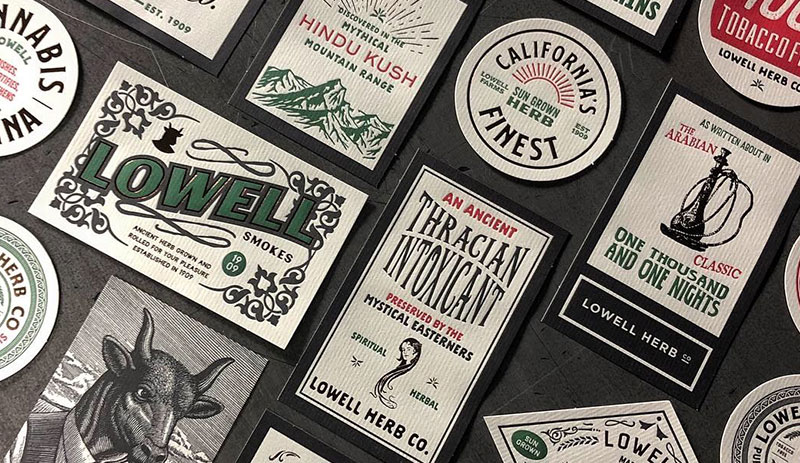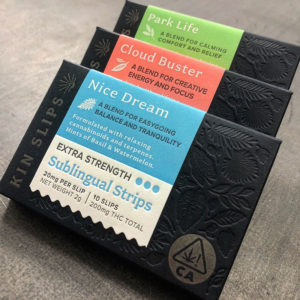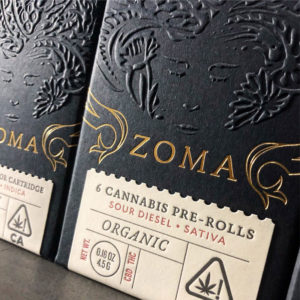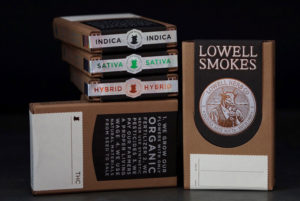
by Katy Ibsen, managing editor
PostPress
The rise of cannabis legalization in the US and Canada has made way for auxiliary industries to capitalize on increased needs from cannabis brands – including packaging.
“It’s a ‘Wild West’ scenario with many jumping on cannabis’ momentum, which creates a surplus of emerging brands, especially in the CBD space which already is legal to sell nationwide,” said April Lytle, marketing coordinator at KURZ Transfer Products.
As the industry grows at a rapid pace, many printing and packaging companies are taking note and looking for an entry point.
The state of legal cannabis
It’s important to understand why many refer to the cannabis industry as the “Wild West.”
Currently, nine US states plus Washington D.C. have medical and adult-use marijuana laws, allowing residents and visitors legal access to cannabis with tetrahydrocannabinol (THC) – known to cause a “high” effect. Additionally, 23 states have, or will have, some form of medical marijuana law, allowing patients with a physician-approved medical card access to cannabis with THC. And across the US, residents 18 and older (in most states) can legally buy forms of cannabidiol (CBD), a hemp extract containing less than 0.3% THC.
In the US, marijuana regulations are managed on a state level by those that have legalized one or more forms; in Canada, regulations are managed on a national level. For all medical and adult-use retail cannabis products, packaging requirements are mandated, and child resistance is a critical one. What varies from state to state and Canada is what information is required to be on the package.
Furthermore, in the last couple of years, a shift in marketing has swept across the industry, empowering brands to consider mainstream audiences as legalization grows.
Enter the printing and packaging industry.
Good design matters
 “A lot of [cannabis] certainly is aliens and tie dye… there’s certainly a lot of stuff that’s marketed like that, but there’s a lot of it that is very premium and well-designed, too,” said Ben Levitz, owner of Studio on Fire in St. Paul, Minnesota.
“A lot of [cannabis] certainly is aliens and tie dye… there’s certainly a lot of stuff that’s marketed like that, but there’s a lot of it that is very premium and well-designed, too,” said Ben Levitz, owner of Studio on Fire in St. Paul, Minnesota.
Studio on Fire has worked with a handful of cannabis clients – those typically in the top 5% of the industry that create a premium product, according to Levitz. Premium cannabis brands recognize the need for quality, luxury packaging, creating opportunities for various specialty effects and foil entities.
Studio on Fire most notably works with the California-based brand Lowell Smokes. This premium cannabis brand markets pre-rolled joints in a well-designed and fashioned carton with a combination of foil stamping and letterpress created by Levitz and his team.
“We are a demanding client. We ask for some fairly complex things that happen,” said Levitz. “There’s a lot of really fine image detail and tight registration. Trying to do that consistently with little six-point condensed type is a tall order. That’s a tough job to go through foil stamping. So, we definitely push our vendors on the materials that they provide, and it’s been a chance to be able to find the best of the best in foils that work really well on difficult, uncoated substrates.”
The importance of luxury
KURZ has long been engaged in premium markets such as wine and spirits. The company has seen how foil can be a game-changer for a brand and help elevate it in the marketplace.
“We’ve heard from many brands already that consultants have told them to look to those successful cousin industries on how to brand themselves,” said Lytle. “Although cannabis hasn’t reached that level of retail competitiveness due to legalization issues, it’s inevitable in the future.”
Identifying cannabis as another luxury market, KURZ is in the throes of developing strategies to grow its cannabis client base. Lytle points to studies that indicate foil increases the likelihood of capturing a consumer’s attention, highlighting the importance of brand development, especially as more legalization occurs, dispensaries open and competitors grow.
A growing market
 Bob McNamara, chief operating officer of Foam Fabricators Inc., located in Denver, Colorado, echoed Lytle’s observation of the cannabis industry.
Bob McNamara, chief operating officer of Foam Fabricators Inc., located in Denver, Colorado, echoed Lytle’s observation of the cannabis industry.
“The cannabis business is growing extremely fast and the margins are nice,” said McNamara. “As brands work to differentiate themselves from the competition, the foil and embossing have really helped their product line stand out in the stores. This isn’t the old business of buying marijuana in a baggie any longer – the product is a much higher quality with stricter regulations and a more affluent customer who can afford to shop and compare.”
McNamara sees so much potential for foil and embossing companies as the cannabis market grows. Currently, his company is working with two packaging companies that design and assemble cartons, specifically for vaporizer pens in different sizes.
“I didn’t imagine being here when I started the company 20 years ago,” said Levitz, adding that Studio on Fire plans to continue to market its work in the cannabis space, noting that brands are looking to differentiate themselves, which his team can help with.
“It’s one of those industries where you can’t really go out there as a small cannabis business and buy ads in the newspaper,” he said. “They’re looking at their packaging as their marketing dollars… The clients that are coming to us are asking for something that’s really lux and really special.”
The Case for Natural Packaging
 Studio on Fire has grown its reputation in the cannabis industry by creating a luxurious carton for Lowell Smokes, a California-based cannabis brand. Ben Levitz, owner of Studio on Fire, pointed to the fact that many cannabis companies are not only looking to differentiate their branding, they also are wanting to use natural products.
Studio on Fire has grown its reputation in the cannabis industry by creating a luxurious carton for Lowell Smokes, a California-based cannabis brand. Ben Levitz, owner of Studio on Fire, pointed to the fact that many cannabis companies are not only looking to differentiate their branding, they also are wanting to use natural products.
“People are looking at cannabis as a natural product, so the packaging should reflect that,” he said. “We’re not doing a highly glossed out, laminated, coated kind of thing. We’re working with materials that are inherently uncoated paper materials.”
While natural products are preferred due to their alignment with the natural side of cannabis, companies must comply with child-resistant packaging regulations, which continue to evolve and vary from state to state. Levitz suggested that packaging companies that can meet child resistant (CR) standards with natural packaging materials may have a leg up.
“For now, a lot of clients are solving those CR criteria by putting things inside of tubes or in a jar that has a CR top. But, so much warning and data testing information has to accompany a cannabis product that oftentimes just the label isn’t necessarily the only packaging thing that they need to do with that,” he said. “So, embellishing that with a carton that has some tactility to it has been a really good path forward for our clients.”

